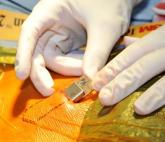News

Continuous AF monitors raise questions about when to intervene
Major finding: After 6 months, Medtronic’s Reveal XT heart monitor implant detected atrial fibrillation in 19 patients (8.6%).

AT The INTERNATIONAL STROKE CONFERENCE
LOS ANGELES – Medtronic’s Reveal LINQ implantable loop recorders misidentified 84% of rhythm anomalies as atrial fibrillation in 52 stroke patients at Emory University in Atlanta, according to a presentation at the International Stroke Conference.
Two electrophysiologists reviewed a random sample of 166 rhythm strips from those patients that were identified by Reveal as atrial fibrillation (AF) over a 2-month period; 140 (84%) were false positives. Eighty (57%) of the false positives were premature atrial complexes, 31 (22%) were due to T wave over-sensing, 14 (10%) to noise, 7 (5%) to premature ventricular complexes, 4 (2.9%) to under-sensing, and 4 (2.9%) to sinus arrhythmias.
There wasn’t a mix-and-match of true and false positives in the same patient; false and true positives were consistent in patients over the study period.
The take-home message from the study is that the high sensitivity of Medtronic’s implantable loop recorders means that they are good at detecting possible AF, but their findings must be reviewed and confirmed before being acted upon.
“There are high rates of false positives, but the results can be easily adjudicated by electrophysiologists as evidenced by our observer agreement,” which was 100%. “These strips need to be adjudicated by somebody, and not taken at face value,” said investigator Dr. Spencer Maddox, an Emory resident.
The devices look mainly at RR intervals and the presence or absence of P waves. Runs of 2 minutes are required for AF. One of the issues in the study was that T waves were identified as QRS complexes, which changed the RR interval and trigged the device to report AF, he said.
Medtronic could reduce the false positive rate by, for instance, extending the run required for AF, but it would be a bad idea. “The goal here is to not miss atrial fibrillation,” Dr. Maddox said. “There are false positives, but as long as you go back and reread, I think that’s fine. I wouldn’t mess with the sensitivity of the device.”
The company said the same thing when asked for comment on the study.
“The AF detection algorithm ... is tuned to favor sensitivity because manual review can subsequently rule out any false positives. This is one reason it is important to have trained cardiologists or electrophysiologists involved in reviewing reports of irregular heart rhythms to determine a diagnosis of AF,” said Medtronic spokesman Ryan Mathre, who also noted that company data suggest a lower false positive rate (Cerebrovasc Dis. 2015;40:175-81).
Even so, confirmation doesn’t always happen, “and that’s the scary part. In practice almost all the time,” the report comes in “and it’s acted on,” said Dr. Robert Hart, a neurology professor at McMaster University in Hamilton, Ont., and comoderator of the study presentation.
The Emory patients were all recovering from ischemic strokes or TIAs. They were about 70 years old on average, about 60% were men, and almost all were white. A total of 38 had implantable loop recorders for cryptogenic strokes; the devices detected true AF in 4 (11%) after a mean of 92 days. Early Holter monitoring missed it.
Emory generally prescribes anticoagulants if AF is confirmed, but, as several audience members noted, the burden of AF that requires anticoagulation is unclear. “It’s an area with a lot of thought now, but no good answers,” Dr. Maddox said at the conference, sponsored by the American Heart Association.
The investigators had no disclosures, and there was no outside funding for the work.

Major finding: After 6 months, Medtronic’s Reveal XT heart monitor implant detected atrial fibrillation in 19 patients (8.6%).


Major finding: Newly detected atrial fibrillation was identified in 30% of cryptogenic stroke patients with an insertable cardiac monitor during...
